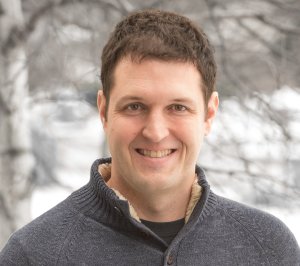Presented By: DCMB Seminar Series
Weekly DCMB / CCMB Seminar Series
Keynote: Nathan E. Hudson, PhD, "Probing the polymerization and structure of a blood clot"

Abstract:
Heart attack, ischemic stroke, and venous thromboembolism are leading causes of death and disability worldwide and often result from aberrant blood clotting. Fibrin is a hierarchical biomaterial that forms the structural backbone of blood clots during the hemostatic process. Clots form when individual fibrin molecules polymerize into linear fibers which then branch into a 3-D gel at sites of injuries. These fibrin networks trap red blood cells and other vascular constituents during the wound healing process.
Using a suite of biophysical approaches, we probe the multiscale formation and structure of fibrin networks. At the molecular scale we establish that individual fibrin molecules are not rigid but adapt multiple conformations that likely assist in polymerization. At the fiber scale, we quantify the processes that govern gelation. Moreover, we demonstrate that fibers exhibit remarkable elastic properties that enable the clot to hold together, even under high tension. At the network scale we reveal how relative changes in the initial concentrations of blood clot components result in remarkably different gel structures.
Taken together, these results provide a wholistic framework for understanding the mechanisms that that determine blood clot structures and linking alterations in these processes to pathologies.
https://umich-health.zoom.us/j/93929606089?pwd=SHh6R1FOQm8xMThRemdxTEFMWWpVdz09
Research Projects:
Nathan Hudson studies the exciting field of molecular biophysics. Work in the Hudson lab uses techniques including protein engineering, centrifuge force microscopy, FRET and microfluidics to understand how mechanical force regulates biological function. Projects involve measuring the biomechanical properties of blood coagulation proteins and determining the force-depending binding kinetics of adhesion molecules. There are both graduate- and undergraduate-level projects in the lab and numerous students have won awards for their research with Dr. Hudson.
Heart attack, ischemic stroke, and venous thromboembolism are leading causes of death and disability worldwide and often result from aberrant blood clotting. Fibrin is a hierarchical biomaterial that forms the structural backbone of blood clots during the hemostatic process. Clots form when individual fibrin molecules polymerize into linear fibers which then branch into a 3-D gel at sites of injuries. These fibrin networks trap red blood cells and other vascular constituents during the wound healing process.
Using a suite of biophysical approaches, we probe the multiscale formation and structure of fibrin networks. At the molecular scale we establish that individual fibrin molecules are not rigid but adapt multiple conformations that likely assist in polymerization. At the fiber scale, we quantify the processes that govern gelation. Moreover, we demonstrate that fibers exhibit remarkable elastic properties that enable the clot to hold together, even under high tension. At the network scale we reveal how relative changes in the initial concentrations of blood clot components result in remarkably different gel structures.
Taken together, these results provide a wholistic framework for understanding the mechanisms that that determine blood clot structures and linking alterations in these processes to pathologies.
https://umich-health.zoom.us/j/93929606089?pwd=SHh6R1FOQm8xMThRemdxTEFMWWpVdz09
Research Projects:
Nathan Hudson studies the exciting field of molecular biophysics. Work in the Hudson lab uses techniques including protein engineering, centrifuge force microscopy, FRET and microfluidics to understand how mechanical force regulates biological function. Projects involve measuring the biomechanical properties of blood coagulation proteins and determining the force-depending binding kinetics of adhesion molecules. There are both graduate- and undergraduate-level projects in the lab and numerous students have won awards for their research with Dr. Hudson.